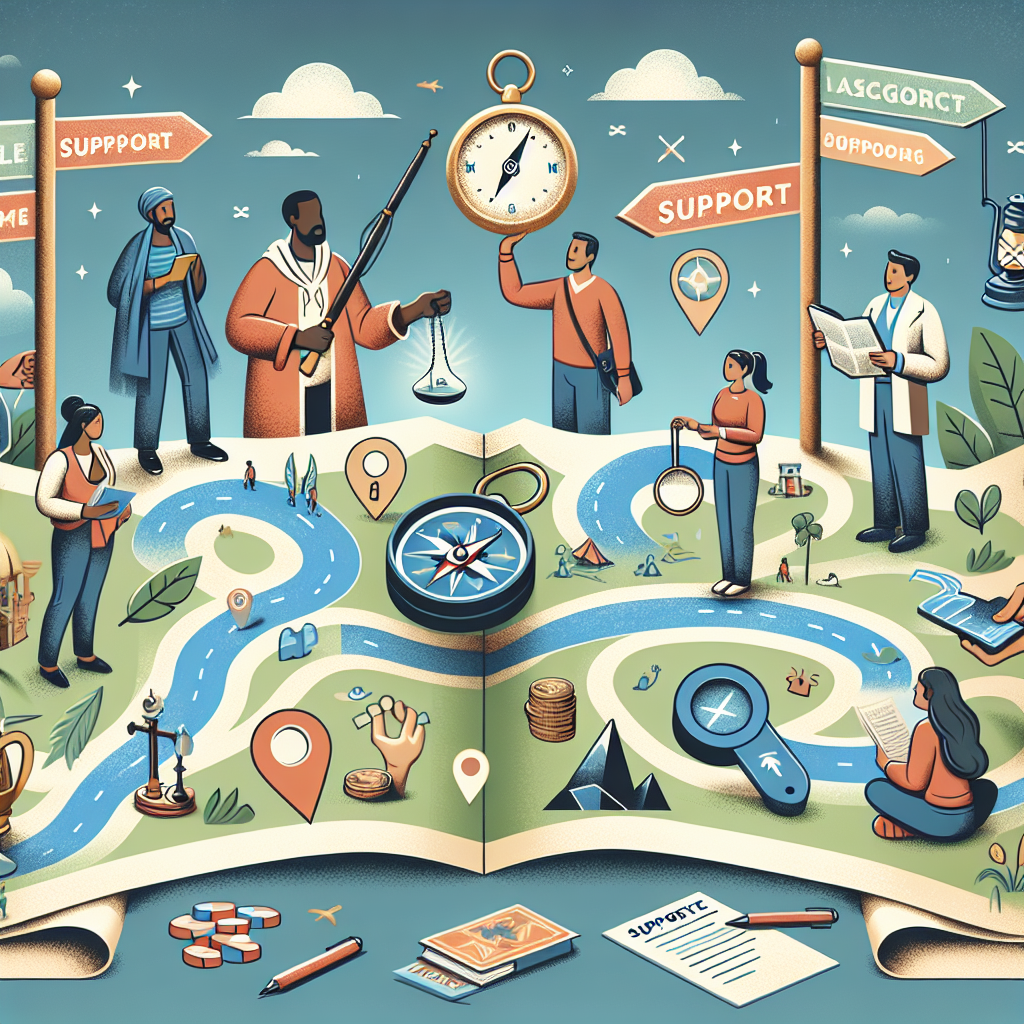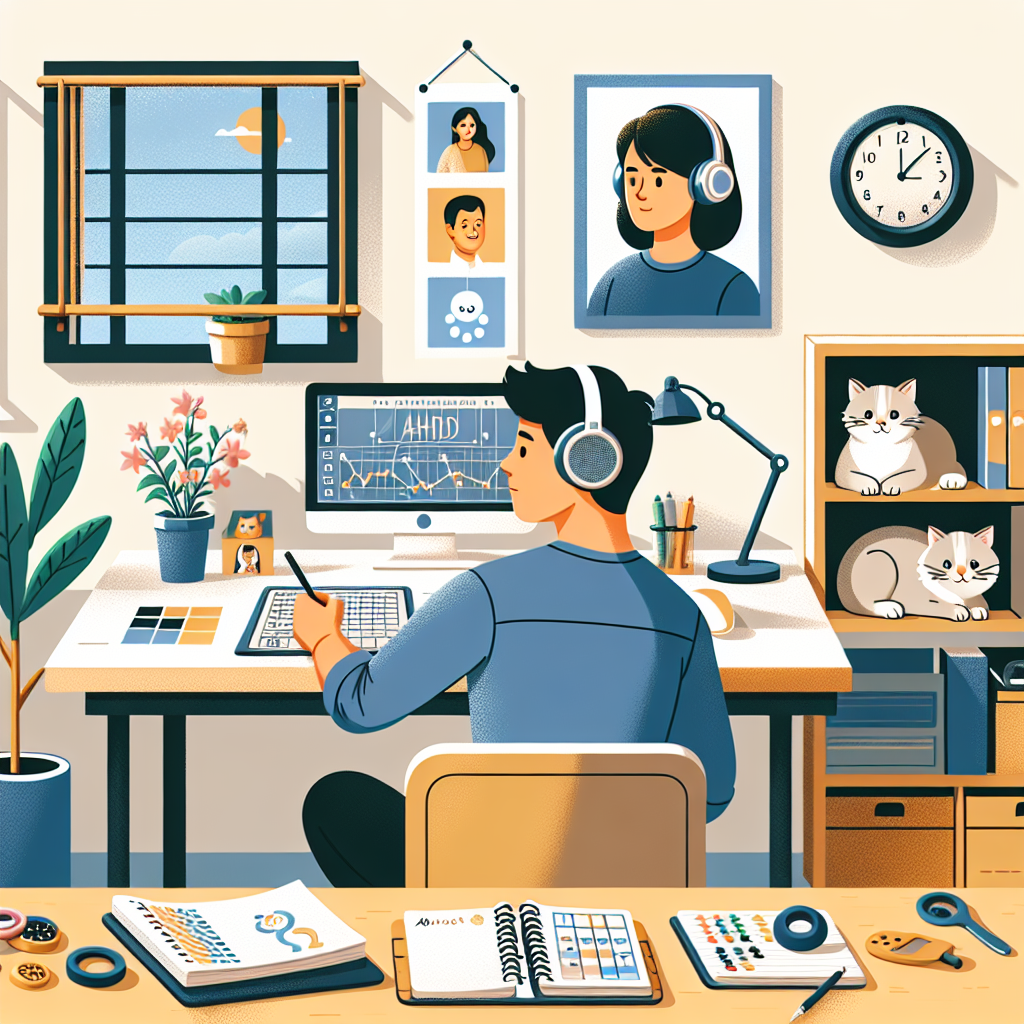
Navigating ADHD Services: Your Complete Guide to Support Options
Introduction
Welcome to the wonderfully intricate world of ADHD services! Navigating the myriad of options available can feel akin to finding a needle in a haystack, but don’t worry—you’re not alone. Whether you’re exploring online ADHD treatment, seeking ADHD therapy, or just trying to make sense of all these terms, you’ve come to the right place.
Attention Deficit Hyperactivity Disorder (ADHD) affects approximately 4.4% of adults in the United States, according to the American Journal of Psychiatry. If you think you might be part of this statistic or know someone who is, it’s crucial to understand the landscape of available ADHD support and resources. From behavioral therapy for ADHD to adult ADHD treatments, there are numerous pathways toward managing symptoms effectively.
Let’s face it: adulting with an attention deficit can be as unpredictable as a cat on caffeine. But before you throw in the towel, know that there are solutions tailored just for you. Here’s a quick peek at what this guide will cover:
- Understanding Your Diagnosis: The first step in navigating any journey is knowing your starting point.
- Treatment Options: From medication management to holistic approaches, explore various strategies that suit your lifestyle.
- Counseling and Therapy: Dive into cognitive behavioral therapy and other effective methods for managing ADHD symptoms.
- Coaching and Support: Learn about executive function coaching and support groups that can help keep you on track.
- Innovative Online Services: Discover how technology is transforming access to ADHD services through telehealth options.
This guide isn’t just about providing information; it’s about empowering you with choices. Because let’s be honest—when it comes to managing adult ADHD, one size definitely doesn’t fit all. So buckle up as we embark on this journey together!
“Adult ADHD affects millions, yet many remain undiagnosed and untreated.” – National Institute of Mental Health
Understanding ADHD Diagnosis Services
Let’s face it, navigating the maze of ADHD diagnosis services can sometimes feel like trying to find your keys while running late for a date. But, fear not! We’re here to make this journey a little less chaotic and maybe even sprinkle in some humor along the way.
Why Getting an ADHD Diagnosis is Important
The first step in managing ADHD effectively is getting a proper diagnosis. Think of it as the roadmap that guides your treatment journey. According to the National Institute of Mental Health, accurate diagnosis is crucial because it informs what treatment approaches will work best for you, whether that’s medication, behavioral therapy, or a mix of both.
Steps to Getting Diagnosed
Navigating ADHD diagnostic services can seem overwhelming, but breaking it down into digestible steps makes it easier:
- Initial Consultation: Begin by meeting with a specialist who understands adult ADHD. They’ll evaluate your symptoms, medical history, and perhaps even share some anecdotes that make you chuckle.
- Comprehensive Evaluation: This might involve questionnaires or interviews where you’ll be asked about daily life challenges. Remember, there are no right or wrong answers—only insights into how your brain works its magic.
- Cognitive and Behavioral Assessments: These tests help pinpoint areas where you might struggle with attention, impulsivity, or hyperactivity.
- Feedback Session: Once all information is gathered and analyzed, you’ll meet with your clinician to discuss results and potential next steps.
The Role of Specialists in ADHD Services
A variety of professionals can assist in diagnosing ADHD:
- Pediatricians or Psychiatrists: Who can prescribe medications as part of your treatment plan.
- Psychoeducational Specialists: Offering insight into educational support for those still in school or university.
- Counselors and Therapists: Providing cognitive behavioral therapy sessions tailored specifically for ADHD symptoms management.
“An accurate diagnosis is the cornerstone for effective ADHD therapy.” – Dr. Focus McClarity
If you’re curious about how an adult might experience these symptoms differently—and yes, there are nuances—you might want to check out our article on The Hidden Struggles: How ADHD Can Affect Women.
The key takeaway here? Understanding your unique brain quirks through comprehensive evaluation isn’t just useful; it’s empowering. So go on and embrace the journey with curiosity—and maybe a touch of humor!
Exploring ADHD Therapy Options
Living with ADHD can sometimes feel like trying to juggle flaming torches while riding a unicycle on a tightrope. But fear not, because when it comes to ADHD services, there are options aplenty! Let’s dive into the ocean of therapy choices that can help you find your balance.
Cognitive Behavioral Therapy (CBT)
CBT is often hailed as the superhero of therapies for those with ADHD. By targeting negative thought patterns and behaviors, CBT aims to transform those pesky procrastination tendencies into productivity powerhouses. A study published in the Journal of Attention Disorders found that CBT significantly improved executive functioning and reduced symptoms in adults (source: Journal of Attention Disorders).
Behavioral Therapy
If you’re looking for strategies to help you stay organized or improve time management, behavioral therapy might just be your new best friend. This form of therapy focuses on reinforcing positive behaviors and minimizing the not-so-great ones. It’s like having a personal coach cheering you on every step of the way!
Medication Management
The mention of medication often raises eyebrows, but when managed correctly, it can be an effective tool in your ADHD toolkit. According to research from The National Institute of Mental Health, stimulant medications are highly effective in reducing symptoms for many individuals with ADHD (source: NIMH). Remember, it’s essential to work closely with an ADHD specialist to find the medication plan that suits you best.
Mindfulness Techniques
If you crave tranquility amidst the chaos, mindfulness techniques might be your path to inner peace. Learning to anchor yourself in the present moment can enhance concentration and reduce impulsivity. Integrating simple practices like deep breathing or short meditation sessions could make all the difference in managing symptoms.
Group Therapy Sessions
Sometimes, sharing is caring—especially when surrounded by others who “get” what you’re going through. Group therapy offers a supportive environment where individuals with ADHD can share experiences, learn coping strategies, and realize they’re not alone on this journey.
“The greatest weapon against stress is our ability to choose one thought over another.” – William James
No matter where you are on your path, exploring different ADHD therapy options can illuminate new ways forward. Remember that at Therapy for Adulting, we understand these challenges all too well and are here to help guide you through them.
The Role of Coaching and Counseling in Managing ADHD
Imagine trying to organize a chaotic room with a blindfold on. That’s what managing ADHD can feel like sometimes. But fear not! Enter the dynamic duo of ADHD coaching and counseling—two invaluable tools that help remove that metaphorical blindfold and guide you toward clarity and focus.
ADHD Coaching: Your Personal Focus Trainer
Think of an ADHD coach as your personal trainer, but for your brain. These skilled professionals provide guidance in organizing tasks, setting priorities, and boosting productivity. According to the Children and Adults with Attention-Deficit/Hyperactivity Disorder (CHADD), coaching can help foster accountability and cultivate strategies tailored to your unique needs.
- Executive Function Coaching: This type of coaching focuses on enhancing skills such as time management, planning, and goal-setting.
- Strategies for Focus: Coaches often introduce techniques like chunking tasks or using timers to maintain attention on specific activities.
For those interested in exploring coaching options, consider checking out our page on adult ADHD treatments.
Counseling: Navigating the Emotional Terrain
If coaching is the guide through daily tasks, then counseling is the navigator through emotional landscapes. Counseling addresses the emotional challenges that often accompany ADHD, such as anxiety or low self-esteem.
“Counseling provides a safe space to explore emotions and develop coping mechanisms, which is essential for managing ADHD symptoms effectively.” — National Institute of Mental Health (NIMH)
- Cognitive Behavioral Therapy (CBT): This therapy focuses on changing negative thought patterns to improve emotional regulation.
- Behavioral Therapy: Helps in establishing better behavior patterns through positive reinforcement techniques.
Counseling is not just about addressing immediate concerns; it’s about building a toolbox for life’s unpredictable adventures. If you’re curious about starting this journey, our resource page on therapy screening tools might be a good place to start.
The Synergy of Coaching and Counseling
While each has its strengths, combining both coaching and counseling can create a comprehensive support system. For many adults with ADHD, this holistic approach can significantly enhance their ability to navigate daily challenges effectively.
If you’ve ever felt like you’re running in circles trying to manage your ADHD symptoms alone—remember, you’re not alone! With the right resources and support systems like coaching and counseling, you can transform your journey from chaos into harmony.
Educational and School Support for Individuals with ADHD
Navigating the educational landscape can feel like trying to solve a Rubik’s cube blindfolded—especially when living with ADHD. But fret not, dear reader; there are plenty of supports available to make this journey a little less dizzying. Whether you’re a starry-eyed student or an equally hopeful parent, understanding the educational and school support options for individuals with ADHD is crucial for success.
Understanding Individualized Education Programs (IEPs) and 504 Plans
First off, let’s chat about Individualized Education Programs (IEPs) and 504 Plans. These are lifelines for students with ADHD in public schools, ensuring they receive the support they need to thrive academically. According to the U.S. Department of Education, an IEP is a written plan developed by teachers and specialists tailored specifically to an individual’s unique needs (source). A 504 Plan, on the other hand, provides accommodations that allow students to learn in a regular classroom setting without altering the curriculum (Washington University). Think of them as your personal runway lights guiding you through the fog of academia.
Accommodations That Make a Difference
- Extra Time: Giving students additional time on tests and assignments helps reduce anxiety and allows them to demonstrate their knowledge more effectively.
- Preferential Seating: Sitting away from distractions like windows or doors can help maintain focus during class.
- Breaks During Tasks: Regular breaks prevent burnout and keep the mind fresh.
- Tutoring Support: One-on-one attention can help reinforce learning and build confidence.
You can discover more strategies for managing ADHD challenges in our article on adult ADHD treatments.
The Role of Educators and Parents
A collaborative effort between educators and parents is essential in supporting students with ADHD. Teachers can introduce behavioral interventions like positive reinforcement, while parents can provide valuable insights into their child’s unique needs. As noted by the National Center for Learning Disabilities, open communication lines between school staff and families lead to better educational outcomes (NCLD). It’s all about teamwork—and maybe some celebratory pizza parties along the way!
“The beautiful thing about learning is that no one can take it away from you.” – B.B. King
If you’ve found yourself asking how these services translate into adulthood—because after all, adulting has its own set of challenges—you might find our ADHD adult therapy options enlightening.
Additional Therapies and Holistic Approaches to Managing ADHD
When it comes to managing ADHD, it’s not just about finding the right medication or therapy. Many adults are discovering a treasure trove of additional therapies and holistic approaches that complement traditional treatments. These options can help improve focus, reduce symptoms, and enhance overall well-being.
Mindfulness Techniques
We’ve all heard about the benefits of mindfulness, but did you know that practicing mindfulness can significantly impact ADHD symptoms? Engaging in regular mindfulness exercises can help improve attention span, reduce impulsivity, and increase emotional regulation. Try simple daily practices like deep breathing or guided meditation to get started.
Diet and Nutrition Support
You might be surprised to learn that what you eat can affect how you manage your ADHD symptoms. Research suggests that a diet rich in omega-3 fatty acids, lean proteins, and complex carbohydrates can support brain function and energy levels (Source: National Center for Biotechnology Information). So next time you’re meal planning, consider adding more salmon or walnuts to your grocery list!
Neurofeedback Therapy
If you’re looking for a cutting-edge approach, neurofeedback therapy might be worth exploring. This method involves monitoring brainwave patterns in real-time and providing feedback to help individuals learn how to self-regulate their brain activity. While more research is needed, preliminary studies show promising results in improving attention and reducing hyperactivity.
“The greatest weapon against stress is our ability to choose one thought over another.” – William James
Cognitive Behavioral Therapy (CBT)
Cognitive Behavioral Therapy, commonly known as CBT, is another powerful tool in the ADHD management arsenal. It’s designed to address negative thinking patterns while equipping individuals with practical coping strategies. CBT can be particularly effective when dealing with procrastination or challenges related to time management.
Exercise: Move Your Body!
- Aerobic Exercises: Activities like running or cycling increase dopamine production – a neurotransmitter closely linked with attention and motivation.
- Yoga: A great way to enhance both physical and mental balance; yoga can calm the mind while increasing body awareness.
- Dancing: It’s both fun and effective! Dancing combines physical exertion with mental coordination – an excellent combo for improving cognitive function.
If you’re on the lookout for ways beyond medications to tackle adult ADHD effectively, these therapies may offer the extra boost needed on your journey towards well-being. For a deeper dive into how these might integrate with other treatments, check out our full resources on ADHD adult therapy services.
The Importance of Family Involvement and Community Support
When it comes to managing ADHD, family involvement and community support are like the secret ingredients in grandma’s famous cookie recipe – essential, yet often underestimated. As adults navigating the complexities of ADHD, we might feel like we’re juggling flaming swords while riding a unicycle. But fear not, because with the right support, you can transform this circus act into a graceful ballet.
Family Support: More Than Just a Safety Net
Family involvement in ADHD management isn’t just a nice-to-have; it’s crucial. Studies have shown that when families actively participate in the treatment process, outcomes improve significantly. For instance, behavioral interventions that include family therapy can help create a supportive environment where communication and understanding thrive.
- Improved Communication: When family members are informed about ADHD and its impacts, misunderstandings decrease, paving the way for more effective communication.
- Shared Responsibilities: Families can assist in creating daily routines, thus reducing stress for everyone involved.
- Emotional Support: Knowing you’re not alone in this journey can be incredibly comforting and motivating.
A study published in The Journal of Attention Disorders highlighted that family therapy significantly improved social skills in children with ADHD (source). Imagine what similar support could do for adults!
Community Support: Your Tribe Awaits
If family is your inner circle, community support is your extended tribe. Think of it as an ensemble cast that makes your life story richer and more engaging. Community resources like support groups offer invaluable connections and insights from those who truly get it because they’ve been there too.
“Surround yourself with those who understand you,” they say, “because they’ll make your stories sound less crazy.”
- Support Groups: Whether online or in-person, sharing experiences with others facing similar challenges can provide new strategies and emotional relief.
- Local Resources: Community centers often offer workshops or talks focused on ADHD education and coping strategies.
- Online Forums: The internet provides numerous platforms where you can engage with others anonymously, if that’s more your style.
Lending credence to the power of community support, research from the National Institute of Mental Health suggests that peer-led interventions are effective complements to conventional treatments (source). So go ahead, find your tribe!
If you’re searching for additional options to bolster your support system or wish to explore professional guidance tailored specifically for adults with ADHD, consider checking out our comprehensive services at Therapy for Adulting. Our aim is to help you transform challenges into opportunities for growth and connection.
Integrative Health Approaches and Telehealth Services
When it comes to managing ADHD, incorporating integrative health approaches can offer a holistic path to balance and well-being. These methods often blend traditional medical treatments with alternative therapies, providing a more inclusive approach to care. Let’s explore some of these options:
- Diet and Nutrition Support: What we eat significantly impacts our focus and energy levels. Some studies suggest that reducing sugar intake and increasing omega-3 fatty acids may help manage ADHD symptoms. (Source)
- Mindfulness Techniques: Practicing mindfulness can enhance concentration and emotional regulation, both of which are challenging for individuals with ADHD. Apps like Headspace provide guided meditations that you can access from your phone.
- Neurofeedback Therapy for ADHD: This form of biofeedback uses real-time displays of brain activity to teach self-regulation of brain function. A promising approach though still requiring more extensive research, it’s available at numerous specialty clinics.
The digital age also brings the convenience of telehealth services, allowing you to access quality ADHD services without leaving the comfort of your home (or pajamas). Whether it’s through secure video calls or mobile apps, telehealth offers a flexible approach to therapy that fits into any busy schedule — because let’s face it, who hasn’t tried multitasking while in line for coffee?
The Benefits of Telehealth for ADHD Services
- Accessibility: No matter where you live, access to qualified specialists is just a click away.
- Flexibility: Schedule sessions around your lifestyle — whether it’s during lunch breaks or after work hours.
- Anonymity: For those who feel uneasy about in-person visits, telehealth provides a layer of privacy.
A study by the American Psychiatric Association found that telemedicine is just as effective as face-to-face consultations for mental health issues.[1]
“Telehealth is not just a substitute; it’s an enhancement.” – Dr. John Torous, Chair of the American Psychiatric Association’s Healthcare Innovation Committee.
If you’re curious about how these innovative treatment methods might fit into your life, remember you’re not alone on this journey. Explore different options and craft an ADHD management plan that’s right for you!
Coping Mechanisms and Strategies to Enhance Focus
For adults navigating the complex world of ADHD, finding effective coping mechanisms can feel like trying to catch a squirrel—fast, unpredictable, and occasionally bewildering. However, enhancing focus doesn’t have to be a Sisyphean task. Let’s explore some tried-and-true strategies that can help you grab hold of that elusive concentration.
1. Mindfulness Techniques
Mindfulness isn’t just for yogis seated serenely atop a mountain. It’s a powerful tool for managing ADHD symptoms. By practicing mindfulness, individuals can cultivate a state of focused attention and awareness, which is often elusive for those with ADHD.
- Meditation: Start your day with a short meditation session. Apps like Headspace and Calm offer guided meditations specifically designed for adults with ADHD.
- Breathing Exercises: Simple breathing techniques can help ground you in moments of distraction. Try inhaling deeply for four counts, holding for four, then exhaling for four.
2. Cognitive Behavioral Strategies
Cognitive behavioral therapy (CBT) is known for its effectiveness in reshaping unhelpful thought patterns and behaviors. Many find CBT invaluable in enhancing focus and managing daily challenges associated with ADHD.
- Breaking Tasks into Smaller Chunks: Overwhelm leads to avoidance. Break tasks into manageable parts to maintain focus and motivation.
- Cue-Controlled Relaxation: Pair relaxation techniques with specific cues to create associations that trigger calmness when distractions arise.
3. Organizational Techniques
If only organizing our thoughts were as easy as organizing our sock drawer (and let’s be honest, even that’s tough sometimes). Implementing structured organizational systems can free up mental bandwidth and enhance focus.
- Use Digital Tools: Apps like Evernote or Trello are great for keeping tasks organized and trackable.
- Create Daily Routines: Consistency is key—establishing daily routines can help reduce decision fatigue and keep you on track.
“By shifting focus from what cannot be done to what can be achieved, individuals with ADHD often discover newfound strengths.” – Children and Adults with Attention-Deficit/Hyperactivity Disorder (CHADD)
4. Environmental Modifications
Your environment plays a significant role in how well you can maintain focus. Tailoring your space to minimize distractions could be the secret sauce you’ve been searching for.
- Create a Dedicated Work Area: Limit distractions by having a designated space for work free from external interruptions.
- Noisy but Focused: Some individuals find moderate background noise helps them concentrate better than silence—hello coffee shop ambiance!
Navigating the nuances of adult ADHD services doesn’t have to be daunting alone—a little humor helps too! For more personalized approaches or online assistance, consider reaching out to an adult ADHD therapist. They’ll help you craft strategies tailored specifically to your lifestyle, so you spend less time chasing squirrels—or thoughts—and more time living your best life.
Conclusion
Embarking on the journey to find the right ADHD services is like finally finding that missing puzzle piece under the sofa cushions—utterly satisfying and a game-changer! Whether you’re seeking ADHD diagnosis services, ADHD counseling, or even medication management for ADHD, remember that there’s an abundance of options tailored specifically for adults navigating this unique path.
Here’s a quick recap of what to consider when diving into adult ADHD services:
- Explore Therapy Options: From cognitive behavioral therapy for ADHD to executive function coaching, there’s no shortage of tools available to help manage symptoms effectively.
- Don’t Overlook Online Resources: In our digital age, online ADHD services provide flexible solutions that can fit seamlessly into busy schedules. Plus, who doesn’t love attending a therapy session in their pajamas?
- Diverse Approaches Matter: Holistic techniques like diet and nutrition support or mindfulness practices can complement traditional treatments and offer a well-rounded approach.
- The Power of Community: Joining group therapy sessions or support groups can offer both insight and camaraderie from those who truly “get it.”
The importance of seeking professional guidance from an ADHD specialist cannot be overstated; they are equipped with the expertise needed to tailor strategies suited uniquely to your needs. Remember, reaching out for help isn’t just okay—it’s admirable!
“We are not defined by our challenges but by how we rise above them.” — Anonymous
If you’re curious about where to start or how to refine your current approach, why not check out our handy Therapy Screening Tool? It’s designed to help navigate through the vast sea of options and match you with suitable resources.
Navigating adulting is no small feat—throw in ADHD, and it’s like trying to juggle flaming torches while riding a unicycle! But with the proper support systems in place, you’ll find your balance sooner than you think. Here’s to embracing every step of this colorful journey!


